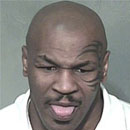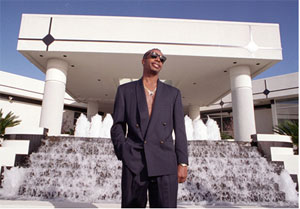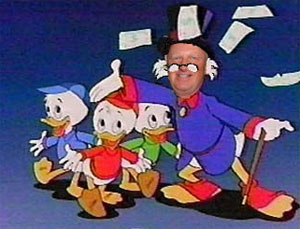History's 6 Greatest Examples of Financial Fail

We live in uncertain economic times. In moments like this, sensible folks save money, invest wisely, and stock up on ammunition for the forthcoming class wars.
Others, however, dump their savings into a gold-plated wheelbarrow so they can carry the $50,000 required to buy a loaf of bread in style. Today, we celebrate those fiscal morons that make lists like this possible.
Mike Tyson

How badass of a boxer was Mike Tyson? He knocked unconscious 26 of the first 28 opponents he faced, 16 of them in the first freaking round. Most of his opponents had no trouble meeting a qualifying weight prior to their fight because of the regularity with which they shit themselves beforehand.
He was the undisputed champ by age 21. Realizing that Tyson was running out of people to punch in the real world, Nintendo inserted him digitally into Mike Tyson's Punchout!! so he could haunt the dreams of children and future opponents alike.

Despite a couple of hiccups along the way, Mike Tyson's notoriety allowed him to eventually command over $30 million a fight, building a fortune in excess of $300 million.
So What Happened?
Well, the "hiccups" included an embarrassing loss to 42:1 underdog Buster Douglas and a rape conviction in 1992. As hiccups go, those would cause your metaphorical diaphragm to eject your lungs on to the pavement. He was incarcerated for 3 years, only to return to boxing more unhinged than he left it:
Still, his $300 million had to make him feel better about all that. After all, that's more money than you can ever spend!
Actually, no. Especially if, like Tyson, you paid hundreds of thousands of dollars to a gentleman answering to "Crocodile," whose job it was to shout "Guerrilla Warfare!" at pre-fight press-conferences. Or if you purchase two Bengal tigers that cost $12,000 monthly for care and feeding (Bengal tigers will apparently only eat meat that has been first coated in gold).

According to reports, Tyson had:
"...custom-made Harley Davidsons, a fleet of Rolls, Bentleys and Ferraris. Once, in Vegas, he bought a batch of six Rolls and distributed them among his friends. He's had a half-million dollar watch emblazoned with pornography."
But worst of all, Tyson got wrapped up in a very expensive addiction. That's right: pigeons. Tyson started a pigeon-breeding operation, winding up with 350 world-class birds imported from all over the world, costing thousands a month in care and feeding and four elaborate coups to house them on his property.
In 2003, Tyson declared bankruptcy, owing approximately $10.2 million to the IRS and creditors.

"Why did I do this?"
What We Can Learn from This:
In the event you become the heavyweight boxing champion, fight the urge to purchase a $100,000 platinum bracelet inscribed with "Heavyweight Champ." We have found that the gold belt occupying a third of your torso does an equally good job of advertising the same. Not to mention the inscription severely limits the potential pool of people to resell to.
Thomas Jefferson

On top of Thomas Jefferson being one of the great icons of American history, he also had the distinction of being the president with the worst credit rating ever.
Jefferson inherited an estate of about 2,500 acres and 30 slaves from his deceased father. It's hard to demonstrate what that would be worth in modern terms, especially since pesky human rights nutjobs have prevented us from determining present market value on slaves, but it's probably a lot.
Of course the man wasn't exactly sitting on his wealth, he made the modern equivalent of $307,000 a year as President, for eight straight years, plus all the perks you can make on the side (such as signing autographs at car shows or whatever).

We can pretend he's signing an autograph, but that's probably the Constitution or whatever.
So What Happened?
We could point out that during his term he spent the equivalent of $120,000 on wine alone. He once ordered 382 bottles in a single month.
But that doesn't seem unreasonable. Being president is a stressful job, you need to kick back now and then with a case of wine.
Then, we have Monticello. This was a time when houses got big and elaborate enough, you gave them names. Single names, like Cher and Prince.

That's the tool shed.
The sprawling estate took nearly 40 years to construct. It was 43 rooms and 11,000 square feet of awesome.
He had little wine elevators built into the walls, to shoot bottles directly up from the wine cellar to the dining room. The man could sit there and eat, reach out to the wall and a fucking bottle of wine would pop into his hand. Bottle's empty, just drop it down the chute, and a full one takes its place. Sure, there was a slave down in the basement operating it, but still. The man knew how to live.

He also these Scooby-Doo style hidden revolving shelves installed, which the slaves would use to serve food, sparing the guests the unpleasant experience of seeing a slave. Are you picturing this? They put food on one side, spin it around. The man had his whole operation set up so that the finest food and drink in the world just magically appeared out of his walls.
Hey, did we mention the house had its own beer cellar? Where he could brew his own, to the tune of 200 gallons a year? Does Bill Gates even fucking have one of those?

Also, it's on a mountain.
Jefferson had his kitchen utensils shipped in from France, in an era when shipping things to the other side of the planet wasn't exactly easy. All told he had 86 crates of paintings and decorations and every other thing boated in from there.
The man couldn't have been more of a pimp if he had outfitted his farm equipment with 20" spinnaz.
But as you can guess, it didn't come cheap. Debts ran out of control and despite the evident strength of his pimp hand, his debtors' payments were infrequent and inadequate. It was really only his prominence and reputation that kept the bill collectors at bay, at least until he died. The executor of Jefferson's estate was left with the modern equivalent of $1 to 2 million in debt, and most of the estate was sold off to pay it off.
What We Can Learn from This:
If you're having difficulty paying back a mounting debt, consider declaring independence from a sovereign nation to forge ideals from the French Enlightenment period. It's a long shot, but TJ demonstrated the power of a killer rep.
Kim Basinger

Remember her? She used to be the biggest female star in Hollywood. Kim Basinger's rise proved that the American dream is attainable for anyone that happens to be a balls-hot, skinny white chick.
Basinger was a beauty queen who was plucked out of her first national competition by the Ford Modeling Agency. When she wasn't busy commanding $1,000 a day for various shoots and shunning sustenance, she studied acting. Her move to Los Angeles lead to appearing as James Bond's love dumpster du jour, Domino Petachi, in Never Say Never Again.

God Almighty, he's hairy.
Shortly thereafter she starred her in seminal work (pun strongly intended) 9 1/2 Weeks, an erotic thriller that famously caused both Siskel and Ebert to state it gave them visible erections. Ultimately it was her last minute replacement of Sean Young in 1989's Batman that cemented her super-star status and really brought in the big bucks. What could possibly go wrong?
So What Happened?
Her starpower was certainly sturdy enough to weather any financial storm as long as she didn't make any really, really ludicrous financial decisions like trying to purchase an entire town or something.

Yes, based on the advice of her family members, many of them likely albino cousins named Jed, Basinger purchased Braselton, Georgia for $20 million. She had designs on turning it into a tourist attraction or possibly just wanted to boost the box office of her films by subjugating the captive population to see each one several hundred times.
Shockingly, the town of 1,206 people didn't become the new Las Vegas.
Then, she got nailed with an $8 million breach of contract penalty for backing out of the film Boxing Helena, at which point Basinger filed bankruptcy.

Just look at that sweet, filthy bankruptcy. Hell yeah.
What We Can Learn from This:
Look, it's going to come up at some point. The salesman will have a great pitch, you'll be impressed by the tour, but damnit, people, don't buy a fucking town.
Now we could add that you shouldn't back out of movies at the last moment or you might get sued, but it turned out Boxing Helena was a movie about a woman who has all of her limbs amputated and lives in a box. So that one was probably worth the bankruptcy in the long run.
Mark Twain

Samuel Clemens aka Mark Twain was known to the world for having a bristly and majestic mustache that awed all who viewed it.

He also was a writer.
Even before he sold tons of books, he worked as a riverboat pilot, an extremely lucrative job for the time. He made $250 a month, the modern equivalent of $155,000 a year, which was still barely enough to keep his moustache fed.
Then he became a famous writer, and the money really poured in. And really, what was there to spend money on back in those days anyway? He was set for life, right?

This might not be him.
So What Happened?
The man hemorrhaged money like a hemophiliac breakdancing on a bed of machetes.
Twain was a habitual gambler, especially so in his predilection for funding speculative investments and a potpourri of inventions. He sunk piles of cash into inventions like an infant bed clamp (intended for affixing sheets, not infants) and a quickly obsolete typesetting device (losing him $4 million in today's dollars).
He even set aside work on "Huckleberry Finn" to concentrate on inventing a children's trivia game, a decision comparable to Bruce Willis shunning the Die Hard series to focus on his band.

Good idea!
Even if he was out of his depth with technology, it was a safe assumption that his publishing house would fare better. Unfortunately, when you make an "assumption" you make an "ass" out of "u" and "mption," because the opposite proved true. Even working in an industry he knew from the inside, every investment paid off about as well as if he'd just piled the cash and set fire to it.
In a letter to Fred Hall, who ran Webster & Co. publishing house, Twain moaned that, "I haven't got a penny to my name."
What We Can Learn from This:
Honestly, he said it best:
"October. This is one of the peculiarly dangerous months to speculate in stocks. The others are July, January, September, April, November, May, March, June, December, August, and February."
MC Hammer

Like it or not, for several years M.C. Hammer held the title as the best-selling hip-hop act in history. Not only did he bring a new standard of showmanship and energy to his genre, he managed to do it without terrifying honkies in the process.
His mainstream adoration translated into massive concert ticket sales, record-setting album sales and the failure of an entire generation to thoroughly question his wardrobe:

His trailblazing didn't stop there. M.C. Hammer's innovation helped him conjure previously unfathomed depths of selling out. Even modern marvels of the unabashed sellout such as Diddy haven't matched the scope of Hammer's marketing reach. So while lots of rappers lend their credentials to clothing lines, fragrances, and launching new pop acts, none can claim to have also achieved their own trading card...

...an action figure...

...and his own Saturday morning cartoon "Hammerman."

Sometime between meetings with various corporate profiteers he managed to find the time to sell over 17 million albums. At his peak, Forbes estimated that Hammer earned $49 million.
The beauty of it was that there was no risk of this financial security and easy-living causing Hammer lose his street edge. He never had one to speak of.
So What Happened?
The arrival of Dr. Dre and the whole g-funk phenomenon started to make acts like Hammer look like a bunch of cornball bullshit. Also, his tour in support of the "2 Legit 2 Quit" album had such high production costs that even sales of three million units couldn't support it.

Still, he had his $49 million, right? Well, by 1992, Hammer employed 200 people, with an annual payroll of $6.8 million. He still might have been able to pull that off had he not purchased a $20 million mansion in the hills above San Francisco Bay.
The 40,000 sq ft house featured Italian marble floors, a bowling alley, recording studio, 33-seat theater, 2 swimming pools, tennis courts, a baseball diamond, 17 car garage and, no joke, a gold toilet. He had originally considered putting in an 18 car garage, but thought it might come off as too flashy. Besides, it would have eaten into the budget he'd allocated to install the fire suppression sprinkler system he needed to mist Cristal over social gatherings.

A man with more fountains than foresight.
In April 1996, Hammer declared bankruptcy, citing assets of $9.6 million and debts of $13.7 million. Since then, he has attained the status of a folk hero of financial ruin, not unlike the lesser documented years of Paul Bunyan performing in The World's Largest Donkey Show with Babe to feed his smack habit.
Artists like Nelly revere Hammer's oblivion by asserting he'll "blow 30 mil like I'm Hammer," a boast that Hammer has happily welcomed coming to fruition for the mouthy punk.
What We Can Learn from This:
Hammer's situation, particularly pertaining to his excessive payroll of associates will ill-defined duties, perfectly exemplified the classical Austrian economic theories that demonstrate collapse of financial systems that endure the strain of excessive homies. This has likewise been cited in the collapse of the Bear Stearns Investment Firm, given its propensity to roll deep with hoodrats.
Dennis Kozlowski

With or without financial missteps, most of the people on this list would remain famous. Dennis Kozlowski holds the distinction of being famous expressly for his fiscal fuckupery. While economic shenanigans are hardly novel among white-collar criminals, his excesses showed the kind of panache that even made the CEO of Enron say "DAAAAMMMMNNNN!"
Kozlowski joined Tyco in 1975 and launched a secret 27-year plan to become CEO and sublimate his diligence into being a full-time douchebag. When he took the helm, Tyco's revenues grew by 48.7% a year from 1997 to 2001 and his compensation surged accordingly. He went from making $8.8 million to $170 million in just 3 years. While he loved his work, he lamented how little time it left him for swimming in his money pool or solving mysteries with his triplet nephews.

Actual photo.
So What Happened?
Kozlowski made an important discovery early in his career: the only thing sweeter than pulling down $170 million is not spending a dime of it while your company coughs up for everything. Prepare to put all of the Post-It notes you've pilfered from the office in perspective.
By abusing a number of Tyco's corporate resources and granting himself unauthorized bonuses in totaling $58 million, he went on an unrivaled spending spree. Starting small, he whetted his appetite for fraud by having Tyco sponsor his wife's birthday party. It was an intimate, $2 million affair featuring a discrete circle of a few dozen toga-clad friends on the island of Sardinia to see a private Jimmy Buffet concert.

Tyco picked up half of the tab, funding it as a work retreat, presumably because it was commonplace to host orgy-themed team building events with ice sculptures of the Statue of David pissing vodka.

He followed this with using Tyco funds to purchase a $19 million New York apartment and an additional $11 million to decorate it. The decorating budget may seem excessive, but it was only intended to pick up necessities like:
$6,000 on a shower curtain
$6,300 on a sewing basket
$17,100 on a traveling toilette box
$2,200 on a gilt metal waste basket
$2,900 on coat hangers
$5,960 on two sets of sheets
$1,650 on a notebook
$445 on a pincushion
$15,000 on a dog umbrella stand (the report was unclear if this was a dog-themed umbrella stand or a stand intended to hold umbrellas for his dogs)

Which is it, Dennis?
None of the items urinated vodka, but they certainly would have been retrofitted to do so if time allowed.
With all of his embezzlement he scarcely had time to spend his own money, but somehow managed to purchase a $30 million home in Boca Raton and the $16 million 130-foot racing yacht "Endeavor." He even had another 150-foot super-yacht in production valued at $25 million that he never got to take ownership of, leaving the manufacturer trying to sell a boat named "Suck It, Tyco Shareholder" at cost.

Ultimately art was his undoing, since he purchased $13 million in paintings for his NY apartment, including a Renoir and Monet, which he had shipped to Tyco Headquarters in New Hampshire because the state has no sales tax. This was a poor decision. Per the lesser known Double Secret Constitution For Powerful White Men, banal offenses like murdering a hooker or skimming corporate profits are benign, but don't even think about trying to weasel out of giving the government its cut.
The $1 million tax bill not only brought him up on Federal charges, but cast light on his rampant bilking of The Man. In 2002, Tyco accounted for over $100 million in fraud and sued for recovery and punitive damages. With his current prison income of $1 per day, he will have that debt paid off midway through the year 275,980.
What We Can Learn from This:
Nothing is surer to make Uncle Sam an angry drunk than depriving him of tax revenue. Secure the services of a reputable, yet morally bankrupt, accountant to track this. Or cut out the middleman and buy the I.R.S.
For some ways that you can be just like the celebrities in this article, check out 5 Retarded Get-Rich Quick Scams (People Still Fall For). Or use your photoshop skills to show us awesome ways to improve the Presidential debates..